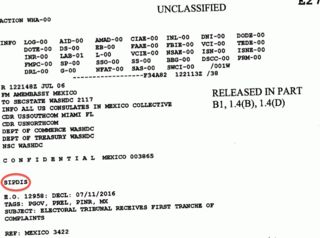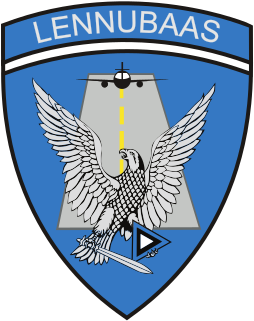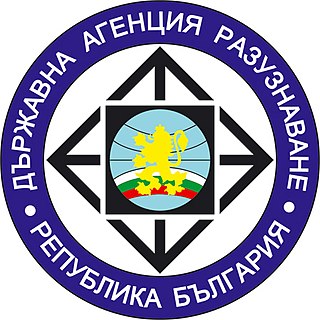The NATO Open Source Intelligence Handbook is the standard reference available to the public. The other two NATO references are the NATO Open Source Intelligence Reader and the NATO Intelligence Exploitation of the Internet.
Electronic warfare (EW) is any action involving the use of the electromagnetic spectrum or directed energy to control the spectrum, attack an enemy, or impede enemy assaults. The purpose of electronic warfare is to deny the opponent the advantage of—and ensure friendly unimpeded access to—the EM spectrum. EW can be applied from air, sea, land, and/or space by manned and unmanned systems, and can target communication, radar, or other military and civilian assets.
In NATO, a Standardization Agreement defines processes, procedures, terms, and conditions for common military or technical procedures or equipment between the member countries of the alliance. Each NATO state ratifies a STANAG and implements it within their own military. The purpose is to provide common operational and administrative procedures and logistics, so one member nation's military may use the stores and support of another member's military. STANAGs also form the basis for technical interoperability between a wide variety of communication and information systems (CIS) essential for NATO and Allied operations. The Allied Data Publication 34 (ADatP-34) NATO Interoperability Standards and Profiles which is covered by STANAG 5524, maintains a catalogue of relevant information and communication technology standards.

Human intelligence is intelligence gathered by means of interpersonal contact, as opposed to the more technical intelligence gathering disciplines such as signals intelligence (SIGINT), imagery intelligence (IMINT) and measurement and signature intelligence (MASINT).
Open-source intelligence (OSINT) is the collection and analysis of data gathered from open sources to produce actionable intelligence. OSINT is primarily used in national security, law enforcement, and business intelligence functions and is of value to analysts who use non-sensitive intelligence in answering classified, unclassified, or proprietary intelligence requirements across the previous intelligence disciplines.

The Secret Internet Protocol Router Network (SIPRNet) is "a system of interconnected computer networks used by the U.S. Department of Defense and the U.S. Department of State to transmit classified information by packet switching over the 'completely secure' environment". It also provides services such as hypertext document access and electronic mail. As such, SIPRNet is the DoD's classified version of the civilian Internet.
Operation Gladio is the codename for clandestine "stay-behind" operations of armed resistance that were organized by the Western Union (WU), and subsequently by NATO and the CIA, in collaboration with several European intelligence agencies. The operation was designed for a potential Warsaw Pact invasion and conquest of Europe. Although Gladio specifically refers to the Italian branch of the NATO stay-behind organizations, "Operation Gladio" is used as an informal name for all of them. Stay-behind operations were prepared in many NATO member countries, and some neutral countries.

Duga was a Soviet over-the-horizon radar (OTH) system used as part of the missile defense early-warning radar network. The system operated from July 1976 to December 1989. Two operational duga radars were deployed, one near Chernobyl and Chernihiv in the Ukrainian SSR, the other in eastern Siberia.
Counter-battery fire is a military battlefield-tactic employed to defeat the enemy's indirect fire elements, including their target acquisition, command and control components. Counter-battery arrangements and responsibilities vary between nations but involve target acquisition, planning and control, and counter-fire. Counter-battery fire rose to prominence in World War I.
Dov M. Gabbay is an Israeli logician. He is Augustus De Morgan Professor Emeritus of Logic at the Group of Logic, Language and Computation, Department of Computer Science, King's College London.

On May 7, 1999, during the NATO bombing of Yugoslavia, five U.S. Joint Direct Attack Munition guided bombs hit the People's Republic of China embassy in the Belgrade district of New Belgrade, killing three Chinese journalists and outraging the Chinese public. According to the U.S. government, the intention had been to bomb the nearby Yugoslav Federal Directorate for Supply and Procurement (FDSP). President Bill Clinton apologized for the bombing stating it was an accident. Central Intelligence Agency (CIA) Director George Tenet testified before a congressional committee that the bombing was the only one in the campaign organized and directed by his agency, and that the CIA had identified the wrong coordinates for a Yugoslav military target on the same street. The Chinese government issued a statement on the day of the bombing, stating that it was a "barbarian act".
The NATO Open Source Intelligence Reader is one of three standard references on open-source intelligence. The other two are the NATO Open Source Intelligence Handbook and the NATO Intelligence Exploitation of the Internet.

Ämari Air Base is a military airbase in Harjumaa, Estonia located 7 km (4.3 mi) south of Lake Klooga and 20 nautical miles southwest of Tallinn. The length of the runway does not include a 250 m (820 ft) overrun at each end.
Intelligence Analysis Management is the process of managing and organizing the analytical processing of raw intelligence information. The terms "analysis", "production", and "processing" denote the organization and evaluation of raw information used in a phase informally called "connecting the dots", thus creating an "intelligence mosaic". The information may result in multiple analytic products, each with different security classifications, time scales, and levels of detail. Intelligence analysis goes back to the beginning of history. Sherman Kent is often considered the father of modern intelligence analysis. His writings include a 1947 book, Strategic Intelligence for American World Policy.

NATO is an international alliance that consists of 30 member states from Europe, North America, and Asia. It was established at the signing of the North Atlantic Treaty on 4 April 1949. Article Five of the treaty states that if an armed attack occurs against one of the member states, it shall be considered an attack against all members, and other members shall assist the attacked member, with armed forces if necessary.
Jeffrey Carr is a cybersecurity author, researcher, entrepreneur and consultant, who focuses on cyber warfare.
The Partnership for Peace Consortium is a network of over 800 defense academies and security studies institutes across 60 countries. Founded in 1998 during the NATO Summit, the PfPC was chartered to promote defense institution building and foster regional stability through multinational education and research, which the PfPC accomplishes via a network of educators and researchers. It is based at the George C. Marshall European Center for Security Studies in Garmisch, Germany. According to the PfPC Annual Report of 2012, in 2012 eight hundred defense academies and security studies institutes in 59 countries worked with the PfPC in 69 defense education/defense institution building and policy-relevant events. The Consortium publishes an academic quarterly journal CONNECTIONS in English and Russian. The journal is run by an international Editorial Board of experts and is distributed to over 1,000 institutions in 54 countries.

North Atlantic Treaty Organization—Pakistan relations are the military–to–military relations between Pakistan and the comprised 30-states military alliance, called NATO.

The State Intelligence Agency (SIA) is a Bulgarian foreign intelligence service, which obtains, processes, analyzes and provides the state leadership with intelligence, assessments, analyses and prognoses, related to the national security, interests and priorities of the Republic of Bulgaria.
Basic intelligence is fundamental or factual information about a foreign country, organization or issue that is collected and produced in intelligence reports by an intelligence organization. In the U.S. Intelligence Community, the CIA World Factbook is the best known basic intelligence publication. The U.S. Department of Defense uses the term "General Military Intelligence" for military basic intelligence.